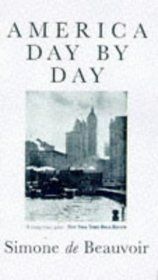Wonderful travel journal froma four month tour of the United States in 1948. Simone de Beauvoir has some very direct and forceful descriptions of racism, intellectual life and life in general in the United States.
Search -
America Day By Day
America Day By Day
Author:
Here is the ultimate American road book, one with a perspective unlike that of any other. In January 1947 Simone de Beauvoir landed at La Guardia airport and began a four-month journey that took her from one coast of the United States to the other, and back again. Embraced by the Cond Nast set in a swirl of cocktail parties in New York, ... more »
Author:
Here is the ultimate American road book, one with a perspective unlike that of any other. In January 1947 Simone de Beauvoir landed at La Guardia airport and began a four-month journey that took her from one coast of the United States to the other, and back again. Embraced by the Cond Nast set in a swirl of cocktail parties in New York, ... more »
ISBN-13: 9780575067127
ISBN-10: 0575067128
Publication Date: 12/4/1998
Rating: ?
ISBN-10: 0575067128
Publication Date: 12/4/1998
Rating: ?
0 stars, based on 0 rating
Publisher: Trafalgar Square
Book Type: Unknown Binding
Other Versions: Paperback, Hardcover
Members Wishing: 0
Reviews: Member | Amazon | Write a Review
Book Type: Unknown Binding
Other Versions: Paperback, Hardcover
Members Wishing: 0
Reviews: Member | Amazon | Write a Review
Please Log in to Rate these Book Reviews
Genres:




